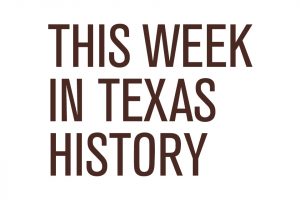A lowly state department functionary, whose only claim to fame was his marriage to Thomas Jefferson’s granddaughter, opened negotiations with Mexico on Aug. 27, 1847 to finally bring an end to the war that had dragged on long enough.
By February 1847, the Mexicans’ intransigence was giving President James K. Polk fits. Though badly beaten in every battle, the hopelessly outclassed opponent refused to concede defeat and showed not the slightest interest in stopping the carnage.
As the victor, Polk expected the vanquished to sue for peace, yet Mexico kept on fighting. Meanwhile, back in the States where the war never had been popular, criticism of the puzzled president threatened to paralyze his administration.
Accepting the unpleasant fact that he had to make the first move, Polk asked secretary of state James Buchanan to pick an obscure career diplomat for a highly unusual assignment. He found the perfect specimen in his own department, a well-traveled clerk by the name of Nicholas Trist.
Viewing their emissary as nothing more than an over-educated errand boy, the last thing Polk and Buchanan wanted Trist to do was to think for himself. Providing him with a draft of the treaty to present to the Mexicans, they emphasized that his main objectives were to secure recognition of the Rio Grande as the Texas boundary and to buy New Mexico and every square foot of California for not a penny more than $30 million.
Polk hoped to keep the mission under wraps, but Trist’s cover was blown before he even left the country. The president blamed Buchanan for the embarrassing leak that had his not-so-secret agent ducking reporters in New Orleans as he scrambled aboard a ship bound for Vera Cruz.
Trist naively presumed that the American commander in Mexico would move heaven and earth to ensure his swift success. But Gen. Winfield Scott, who felt the honor of accepting the Mexican surrender belonged to him and him alone, wanted nothing to do with the meddlesome civilian.
For two costly months, Trist and Scott waged an indirect war of words in emotional communiques to their respective superiors. Told by Washington to cooperate or else, the antagonists astonished themselves by becoming bosom buddies in a matter of days.
While the diplomat and the general basked in the warm glow of their new-found friendship, the American invaders were steadily advancing on Mexico City. At the same time, Santa Anna returned to power and through the British discreetly contacted the presidential envoy. Trist cleverly arranged a temporary cease-fire, which led to the first round of negotiations in August.
Judging from the behavior of the Mexicans at the initial meeting, an uninformed fly on the wall would have thought the United States was losing the war. Arrogantly listing their own “terms,” they told Trist that the Nueces not the Rio Grande was the only acceptable border with Texas, no portion of California south of San Francisco was for sale and New Mexico would forever be a sacred part of the motherland.
When Trist calmly requested the absurd demands in writing, the Mexicans changed their tune. After a brief caucus, they offered to give up New Mexico and southern California in exchange for a compromise on the delicate issue of the Texas border. Trist stood his ground, and the talks broke down on Sept. 3.
Five days later, hostilities resumed, and within the week the Mexican capital fell to the U.S. offensive. As Trist tried to figure out who was in charge following the mysterious disappearance of Santa Anna, President Polk succumbed to his second-guessing cabinet.
On Nov. 27, 1847, Trist received instructions from Buchanan to terminate negotiations and come straight home. Agonizing over his options for seven days and nights, the frustrated diplomat explained in a long letter to the secretary of state that his compliance meant passing up the last chance for peace. Therefore, he had no alternative but to stay at his post and finish the job.
Again using the British as go-betweens, Trist warned the Mexicans that the very survival of their society was at stake. Negotiations resumed in the closing days of 1847 at Guadalupe Hidalgo, where on Feb. 2, 1848 Trist got everything the president wanted.
A newspaper reporter hand-carried the historic document to Washington, while Trist stayed behind to wrap up the details. Over the objections of Buchanan, Polk sent the treaty to the senate, which ratified it on Mar. 10 by four votes.
As for Nicholas Trist, his amazing feat of diplomacy failed to save him from bureaucratic banishment. Shamefully snubbed by the president, press and public, his only reward was a pink slip from the state department.
To add insult to injury, the indomitable peacemaker, who singlehandedly ended the Mexican War and added a huge chunk of territory to the United States, was forced to wait 23 years for his last paycheck.
Signed copies of “Texas Boomtowns: A History of Blood and Oil” are going fast but still available. Order while they last with a check for $28.80 to Bartee Haile, P.O. Box 152, Friendswood, TX 77549 or on-line at barteehaile.com






